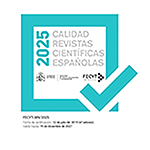Teología política y modernidad. Carl Schmitt y el pensamiento político posfundacional
Resumen
A pesar de sus raíces conservadoras y su compromiso político con el nacional-socialismo, Carl Schmitt y su obra han sido recuperados por la teoría democrática y el pensamiento político posfundacional como fuente para pensar la política de un modo radical. Pero ¿Es Schmitt útil para un pensamiento post-tradicional? En este artículo argumentaré que sólo a través de una revisión crítica del concepto de teología política –y de su relación con la modernidad– es posible responder a esta pregunta. Para Schmitt, la teología política significa, simultáneamente, el reconocimiento de la ruptura radical con la tradición y el desafío a la búsqueda moderna de autonomía política. Partiendo de esta dicotomía, restituiré el carácter ambiguo y controvertido del concepto teología política con el objeto de delimitar las posibilidades de apropiación de la obra de Schmitt para un pensamiento político radicalDescargas
Descarga artículo
Licencia
La revista Res Publica. Revista de Historia de las Ideas Políticas, para fomentar el intercambio global del conocimiento, facilita el acceso sin restricciones a sus contenidos desde el momento de su publicación en la presente edición electrónica, y por eso es una revista de acceso abierto. Los originales publicados en esta revista son propiedad de la Universidad Complutense de Madrid y es obligatorio citar su procedencia en cualquier reproducción total o parcial. Todos los contenidos se distribuyen bajo una licencia de uso y distribución Creative Commons Reconocimiento 4.0 (CC BY 4.0). Esta circunstancia ha de hacerse constar expresamente de esta forma cuando sea necesario. Puede consultar la versión informativa y el texto legal de la licencia.









